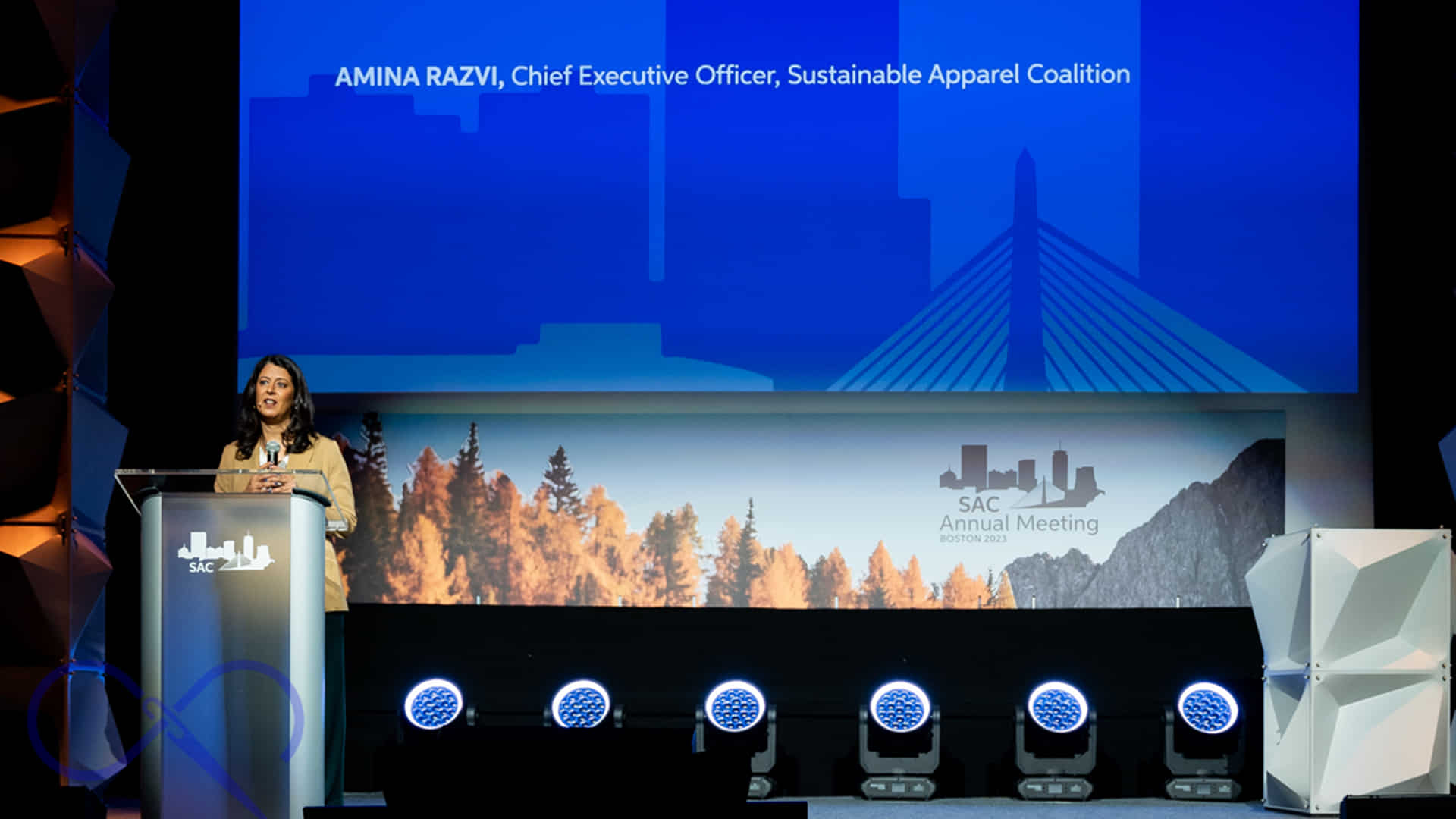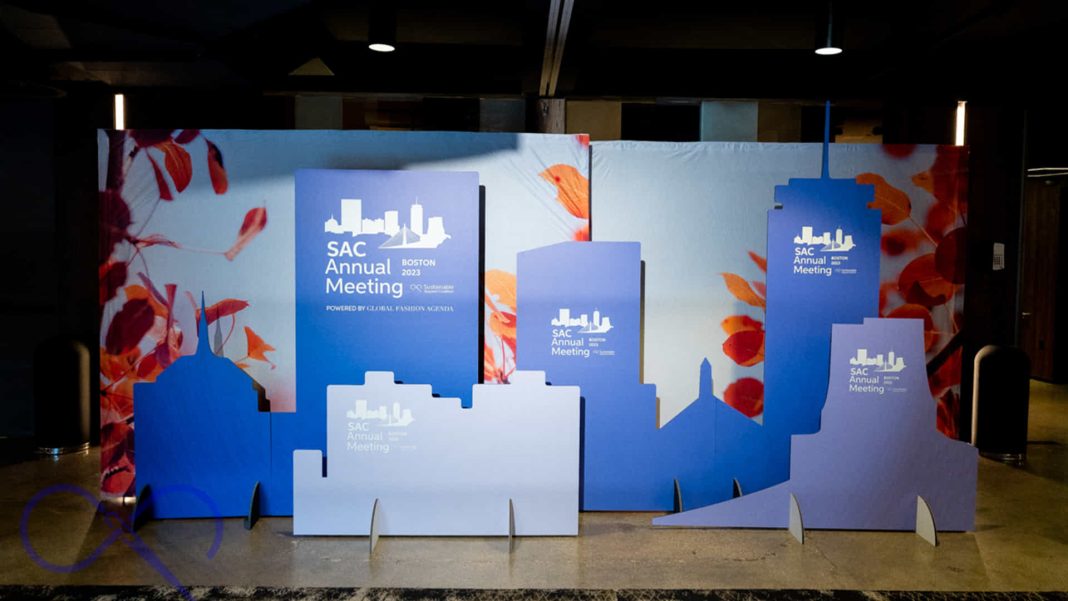The Sustainable Apparel Coalition (SAC), assembling experts from all over the world to create sustainable solutions that redefine the sector, held its annual meeting on September 26, in Boston, MA with the participation of more than 500 in-person and virtual attendees. The event highlighted the theme of ‘Evolution for Impact’ was sponsored by Target Corporation, Lululemon, REN Energy, and Worldly, an impact intelligence platform that is the exclusive licensee of the Higg Index tools. Bringing together stakeholders from across the fashion and apparel value chain, the event enabled participants to discuss and explore opportunities for the industry as well as to strengthen partnerships for real and lasting impact for people and the planet.
In the annual meeting, SAC announced the signing of a Memorandum of Understanding (MoU), planning a strategic collaboration with the International Apparel Federation (IAF) by intensifying efforts to promote sustainable global supply chains for the fashion and apparel industries. This strategic partnership acknowledged the importance of each organization’s unique core capabilities, skill sets, and expertise to create complementary solutions, industry roadmaps, and frameworks as well as working together to increase the voice, engagement, and genuine influence of manufacturers. Executive Vice President at Sustainable Apparel Coalition Andrew Martin noted that they are delightful for this collaboration and continued as follows:
“We are at a critical point for our planet and now more than ever, we must work together to solve the industry’s most urgent and systemic issues, and doing all we can to elevate manufacturer voices and perspectives is essential not only for the SAC but our industry. At the SAC, we have renewed our commitment to collaborate with key industry stakeholders and organizations to develop solutions that foster equitable and restorative business practices, as evidenced by the recent launch of our updated strategy. Our collaboration with the IAF will only accelerate the momentum.”

Manufacturer Climate Action Program emphasizes four core elements for sustainable future
Another highlighted announcement was the new Manufacturer Climate Action Program (MCAP) that allows manufacturers to reduce energy use, save money, and meet the business expectations of their customers. MCAP’s Decarbonization Program aims to promote the sector toward ambitious and necessary CO2 emissions reductions by emphasizing the urgent need for collective action of the textile and apparel industry. Aiming to reduce global CO2 emissions by 45% by 2030, this program has comprised four core elements. First, manufacturers need to set science-aligned emission reduction goals for a sustainable future, then as a second step they will be given recommendations and training developing climate risk assessments for their operations. After these steps, manufacturers will be supported with guidance for their decarbonization strategies. As the final step, MCAP encourages manufacturers to be open and transparent about sharing their reports publicly by which they will ensure accountability within organizations as well as nurture a collaborative culture and innovation. The Sustainable Apparel Coalition Director of Collective Action Programs Joyce Tsoi explained the program as follows:
“Through our Decarbonization Program, we co-create solutions and foster collaborations necessary for systemic change within global supply chains, recognizing that addressing this challenge requires that no single entity can tackle this challenge alone. MCAP represents a key initiative, uniting manufacturers globally to accelerate action towards science-aligned emissions targets, significantly reducing global CO2 emissions at scale. By partnering with industry leaders and offering scalable solutions, we can empower our industry to confront emission reductions and instigate the change we need to support low-carbon transition.”

Sustainable Apparel Coalition’s strategic plan guides manufacturers
In the annual meeting, SAC also underlined its strategic plan, which was announced at New York Climate Week. SAC created a focused plan to respond industry’s urgent needs and aimed to measurable impact sustainability. It is emphasized that this plan has 3 pillars: combating climate change, decent work for all, and nature-positive future. Each pillar has a certain attribute and initiative. While combating climate change highlights SAC’s efforts to building robust capabilities, developing data systems, and refining target-setting for manufacturers, decent work for all helps adoption of effective foundational management systems to manufacturing base. Nature positive future, on the other hand, targets supporting manufacturers in terms of circular product design and development practices.
Chief Executive Officer of the SAC Amina Razvi underlined the crucial importance of collaboration for achieving sustainable goals such as 45% reduction in greenhouse gas emissions by 2030. Razvi, remarking that thanks to SAC’s Decarbonization Plan more than half of SAC members have either set or committed to set Science-Based Targets (SBTs) for GHG reduction, commented on the event as follows: “Together we share an extraordinary opportunity and a profound responsibility for our industry and beyond to deliver the necessary changes and accelerate progress. The question is no longer just about intent – it’s about tangible results.”
